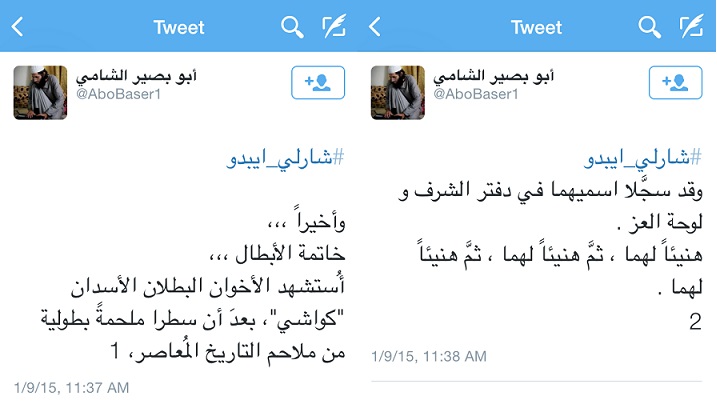TWEE-HAD: شارلي_إيبدو# (#CharlieHebdo)
TWEE-HAD: شارلي_إيبدو# (#CharlieHebdo)
By Michael S. Smith II
As news organizations reported the hostage situations in France that followed the attack on the headquarters of Charlie Hebdo had concluded with the deaths of the Kouachi brothers and at least one of their ostensible coconspirators jihadis immediately began lionizing these terrorists via Twitter (examples above).
It is not yet clear if al-Qa’ida — perhaps vis-à-vis its Yemen branch (AQAP) that is helmed by al-Qa’ida’s second-in-command — will claim responsibility for these events. Yet it is almost certain that, if al-Qa’ida intends to do so, its leaders would await the conclusion of these events before crafting official public messages regarding them. This, in order to tailor narratives in a manner that reflect and perhaps attempt to capitalize on the totality of events (ie praising any so-called “martyrs,” or, in the event authorities captured participants, to call on other jihadis to take hostages to use in efforts to secure the releases of them).
While it may take days or even weeks for al-Qa’ida’s leaders to coordinate a formal statement about the events that have unfolded in France, within hours of the shooting spree at the offices of Charlie Hebdo propagandists affiliated with al-Qa’ida signaled the attack was the handiwork of AQAP. Reportedly, so too did one of the attackers, who apparently told a bystander to advise the media that he had ties to AQAP.
Other indicators that al-Qa’ida’s hand was evident in the recent terrorist attacks in France include the following:
- In 2013, a photo of Charlie Hebdo editor Stephane Charbonnier was featured on a hit list published in Inspire, al-Qa’ida’s leading English-language publication that is produced by AQAP’s media wing;
- Released a few weeks before his murder, in the latest edition of Inspire, the cover story that is attributed to the “External Operations Committee” called for attacks in France (along with the US and UK);
- In the latest edition of Inspire, an image of a French passport is found in a montage section titled “Mujahid’s Notes”;
- In the latest edition of Inspire, the AQAP propagandist known as the “AQ Chef” advised jihadis who seek to execute attacks in the West that it is important to leave some form of calling card that helps authorities attribute their crimes to al-Qa’ida. And that is almost certainly what one of the Kouachi brothers did by leaving his ID behind for authorities to discover; and
- Apparently, one of the attackers participated in some sort of terrorist training program offered by AQAP.
It is also important for analysts to consider that this type of attack is precisely what al-Qa’ida military officials like Saif al-Adl believed would be a more effective use of al-Qa’ida’s resources than such grand attacks as the one al-Qa’ida executed in the US on 11 September 2001. According to their logic, not only are dynamic plots like the 9/11 plot of 2001 more easy for authorities to detect, but, if successfully executed, 9/11-styled plots are more likely to prompt potentially devastating responses. Furthermore, it is much easier — and no less terrorizing — to unleash successive small-scale attacks than it is to mobilize “spectacular” attacks a la 11 September 2001.
Indeed, at a time when al-Qa’ida’s former Iraq branch is attempting to eclipse the specter of al-Qa’ida, it is reasonable to anticipate pragmatism will prevail when it comes to attack plots hatched and operationalized by al-Qa’ida. Thus, although al-Qa’ida will almost certainly continue to aspire to execute spectacular attacks, such as the bombings of airliners called for in the latest edition of Inspire, it is very likely the organization will increasingly orient its resources toward easy-to-execute attacks like the ones that have unfolded in France. Either by plotting them internally, or by encouraging jihadis sympathetic to the group — some trained by al-Qa’ida, some not — to autonomously plan and execute such attacks in the name of the so-called “Global Lone Jihad Movement,” as described in the latest edition of Inspire.
Meanwhile, unless social media companies like Twitter take steps to dissuade jihadis from utilizing their services by, for instance, requiring that all users must enable location tracking features on their computers and mobile devices in order to post messages, etc, al-Qa’ida, Daesh and a long list of other terrorist groups will continue hijacking otherwise seemingly harmless message transmission and networking vehicles to mobilize such attacks, even if by inspiration alone.




